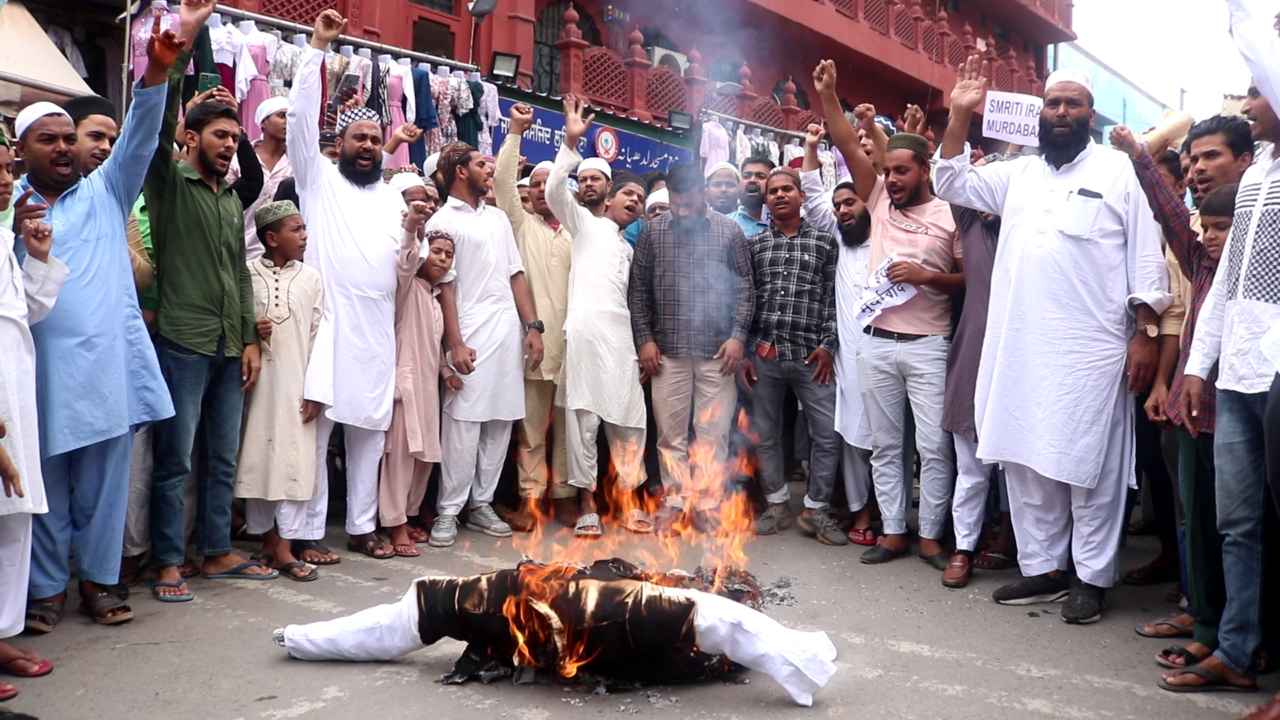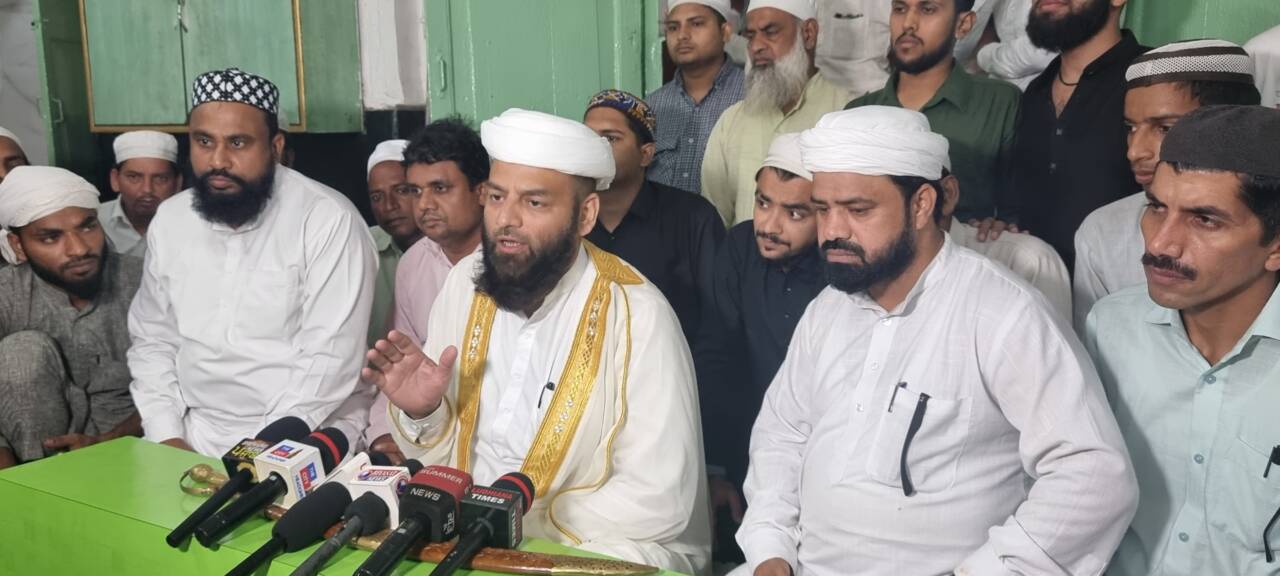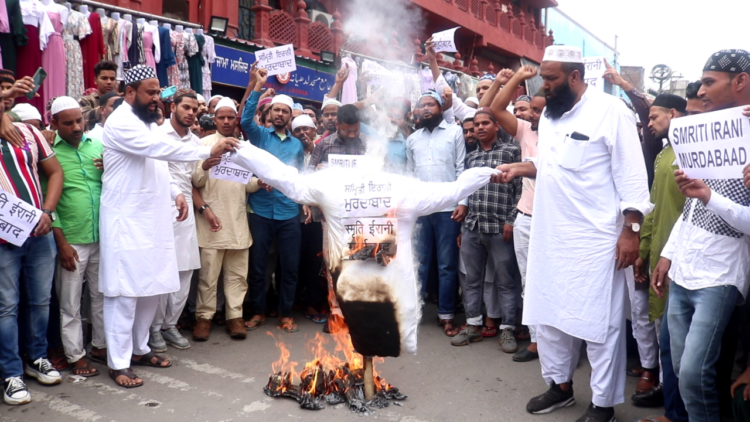On July 26, Minority Affairs Minister Smriti Irani said no Waqf Board in the country has the authority to expel a person or a community from a religion, remarks that come amid a row over the Andhra Pradesh Waqf Board passing a resolution describing the Ahmadiyya community as non-Muslims. Following her statement, there have been protests around the country by Islamists. During one such protest in Punjab’s Ludhiana, an effigy of Irani was burnt near the Jama Masjid.
Prominent Muslim organisation Jamiat Ulema-e-Hind on July 25 backed the Andhra Pradesh Waqf Board’s stance on the Ahmadiyya community, claiming that this is the “unanimous position” of all Muslims.
Readers should know that in this judgement the Andhra Pradesh Waqf board termed the Ahmadiyya community as “kafirs” and non-Muslims.
Irani’s remark on Ahmadiyya Muslims
On the other hand, Irani said, “No Waqf Board has authority, under the Act of Parliament, that it expels a person or a community from a religion. We have sought a reply from the Andhra Pradesh chief secretary. We have requested him to put the facts before us because the Ahmadiyya Muslim community had appealed to the Minority Affairs Ministry,” reported PTI.
“I only want to say that all Waqf Boards come under the Act of Parliament. No Waqf Board can act contrary to the dignity of Parliament and violate laws made by it. No Waqf Board has permission to change a fatwa into a government order,” she added.
The minority affairs ministry has written a strongly-worded letter to the Andhra Pradesh government, calling the board’s resolution a “hate campaign”, which “could have ramifications across the country”.
Protests in Ludhiana
On July 28, Muslims gathered outside the Jama Masjid in Ludhiana and burnt an effigy of Irani as their protest towards her decision on Ahmadiyyas.
On this occasion, the National President of Majlis Ahrar Islam and Shahi Imam of Punjab, Maulana Muhammad Usman Rahmani Ludhianvi said that the Union Minister, who is announcing the support of the Qadiani Jamaat by using the excuse of the Andhra Pradesh Waqf Board, is not only regretful but also interference in the decisions of Islam, which will never be tolerated by Indian Muslims.

Shahi Imam Maulana Muhammad Usman Rahmani Ludhianvi said that it is surprising that Irani is giving a statement in favour of the Qadiani Jamaat, saying that she is giving this advice to the Waqf Board as a minority minister. Shockingly, she is the one who remained silent on the Manipur issue despite being the Minister of Women and Child Development.
Shahi Imam Punjab said that Irani should have seen both history and facts before supporting the Qadiani Jamaat, just as one cannot become a member of the BJP by opposing their policies, in the same way, if a follower of any religion does not follow the basic tenets of his own religion, then he cannot live in this religion.
Minister Irani should not forget the history of Qadiani Jamaat before supporting them, it is not enough to support them because they are against Islam and Muslims. She should recall that, the foundation of Qadiani Jamaat was laid during the British Empire in India. When the freedom fighters were sacrificing their life in the freedom struggle, Mirza Ghulam, the founder of Qadiani Jamaat, was shamelessly writing advertisements and books in support of the British government.

Shahi Imam said, “if Irani was not busy doing politics over the matter she must have seen how people from the Ahmadiyya community are involved in terror activities and a number of cases are registered against them,”
He added that, “We want to remind the Modi government in our message that there are no Pasmanda Muslims in our religion, but if the government still wants to garner the sympathy of India’s majority Muslims by calling them Pasmandas economically, then remember that whether we are Muslims or not, our last prophet Muhammad is dearer to all Muslims than their life and property. If any minister of the government advocates Jamaat-e-Qadian which is against our beloved Prophet Muhammad, then the Muslims of the whole country are united in this matter and will not tolerate the insolence”.
“As far as the rights on the Waqf properties are concerned, these properties have been made by the followers of Muhammad, by the Muslims with their good earnings and not by the followers of Mirza Qadiyani, the traitor of Jang-e-Azadi, so only the Muslims have the right on these properties. No one else,” he added.
Shahi Imam Maulana Muhammad Usman Rahmani Ludhianvi said that “We also make it clear to you that there are Shia, Sunni, Barelvi, Deobandi Muslims in Islam, but all of them also have a united decision regarding Ahmadiyya Jamaat that Jamaat-e-Qadian has no relation with the Islam.”
Imam said that Irani should unconditionally withdraw her irresponsible statement.
Why are Ahmadiyyas considered Non-Muslims by the orthodox Muslims living in Islamic countries?
Ahmadiyya (an Islamic sect) consider Mirza Ghulam Ahmed, their founder as a kind of Prophet. Notably, Ahmed came after Muhammad, whom Sunni Muslims consider the last Prophet. His claims and revelations landed him into great trouble and his followers are facing it to date.
The rise of the Ahmadiyya movement and Ahmed in general dates back to 1836 and the movement lasted till 1906. Thousands of his believers find his theory of the ‘Promised Messiah’ true and that is why they are being opposed by the orthodox Muslims.
Ahmed in 1891 claimed that he is a—Prophet, a revivalist (mujaddid) and the promised messiah (mahdi) anticipated by the Muslims. He gained thousands of followers in this period and his death split the movement into two. The first who believed he is a messiah and the others who consider him as a reformer but adhere to the common practices of Islam and follow Muhammad.
It is noteworthy that the Sunnis and Shias living in Islamic countries do not consider Ahmadiyya as Muslims. In fact they are marginalised, discriminated and even violently oppressed by the majority of Mohammedan.
For instance, After decades of struggle, the Ahmadiyyas are still considered as the Non-Muslim minority as per the Pakistani law passed in 1974. A law even barred an Ahmadi from holding the office of the President in 1973.
These rules have forced Pakistani police to destroy Ahmadi copies of the Quran and related commentaries, restrict Ahmadis from writing their confession of faith (kalma) on their gravestones, stop them from building mosques, and even restrict them from using the term “masjid” (or & “mosque”) to refer to their place of worship. The same is the case in Bangladesh, as the minority Ahmadiyyas are struggling to find a place among Islamists.
Violence against Ahmadi Muslims has also been rampant throughout the world since their founder, Ahmed claimed to be a ‘Promised Messiah’.
There are a number of reasons for these protests, but the first and foremost is Ahmed calling him ‘Prophet’ which is against the orthodox Islamic tenet who considers Muhammad their last founder.



















Comments